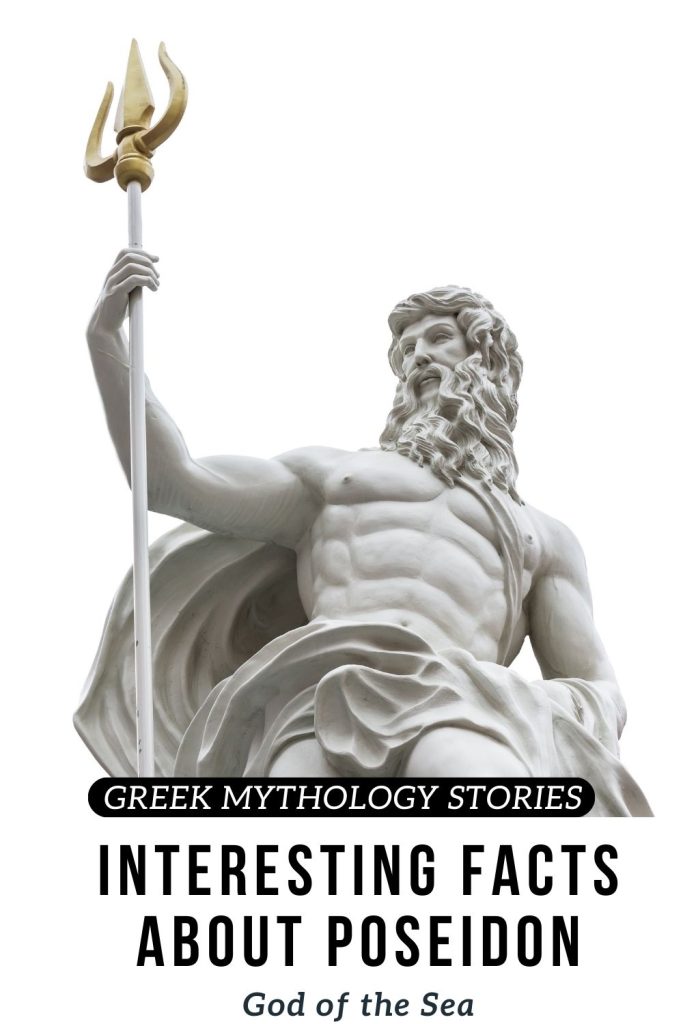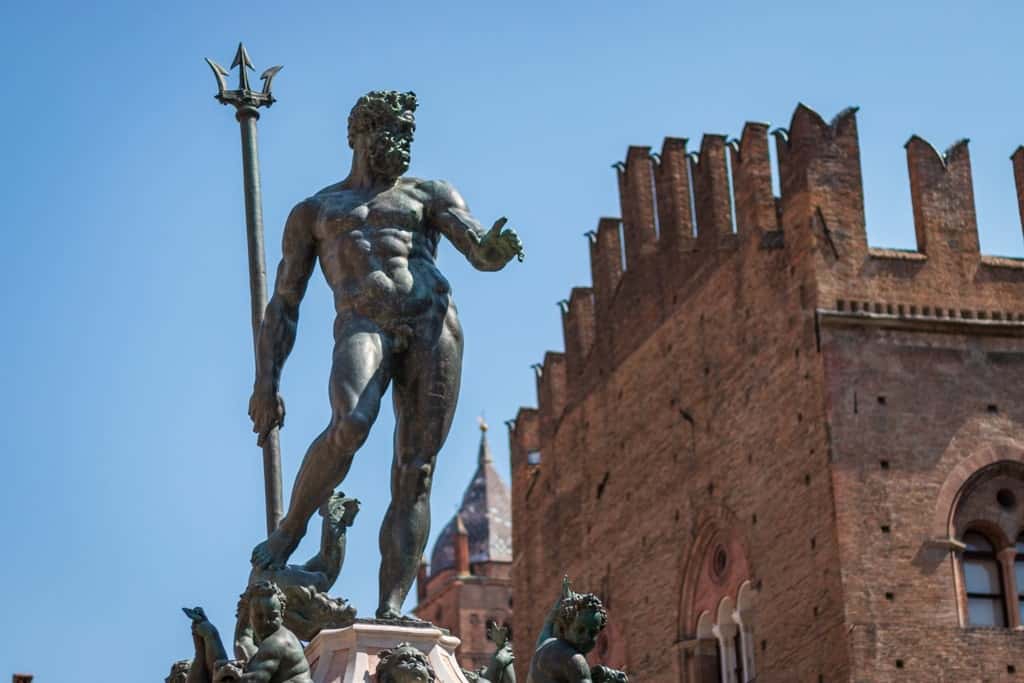Poseidon is the god of the sea and earthquakes in ancient Greece. He is considered one of the three most powerful gods of the Olympic Gods and the Greek pantheon in general, together with Zeus and Hades. Thanks to modern pop culture, the image of the bearded man with the giant trident is present everywhere. But there’s so much more to this important deity than just a cool appearance!
There are a lot of myths surrounding Poseidon, who is one of the oldest gods of the Greek pantheon. So much so, that some scholars believe Poseidon was being worshipped even before the other Greek gods, in the Minoan era.
For such an old and nuanced deity, it is surprising that all that is widely known about Poseidon is his trident and association with the sea when there’s so much more to him! So let’s dive into Poseidon’s rich mythology to learn who he really is.

- 9 Fun Facts About the Greek God Poseidon
- Poseidon’s parentage and birth
- Poseidon as a god
- Poseidon could cause earthquakes
- Poseidon competed with Athena for Athens
- Poseidon created horses
- Many of Poseidon’s children were monsters, but some were heroes
- Poseidon’s children arm Zeus
- Poseidon tried to overthrow Zeus
- Poseidon is the reason the Odyssey happened
9 Fun Facts About the Greek God Poseidon
Poseidon’s parentage and birth
Poseidon’s parents were the mighty titans Cronus and Rhea. Cronus was the previous king of the gods before the Olympians took over. He ruled over the world with his wife Rhea, after overthrowing his father Uranus, the god who was literally the sky.
When Rhea was pregnant with their first child, Poseidon’s mother Gaia, the goddess who was literally the Earth in Greek mythology, made a prophecy. She predicted that one of Cronus’ children would go on to overthrow him just like Cronus had overthrown Uranus.
This prophecy struck fear in Cronus’ heart, so as soon as Rhea gave birth he demanded to see the baby. When Rhea handed the baby over, Cronus swallowed it whole. That first baby had been Hades. But when Poseidon was born a little later, he too was swallowed up whole by his father Cronus.
He stays in his father’s belly together with his other siblings that followed until Rhea’s last son, Zeus, was born. She managed to save him from being swallowed up by Cronus. When he grew up, he made Cronus throw up all his siblings, and that included Poseidon.
As soon as they were out in the world, Zeus’ siblings joined in rebellion against their father. In the great war that ensued, the Titanomachy, Poseidon fought alongside Zeus. When Cronus was overthrown, he, Zeus, and Hades split up the world into territories: Zeus took the sky, Hades took the underworld, and Poseidon took the sea.
Poseidon as a god
Poseidon is always depicted as a strong, well-exercised, mature man in his 40s. He always has a lush beard and carries his trident. He is considered wise and extremely powerful, commanding all seas and waters, with lesser deities associated with water being subjects of his realm.
At the same time, he has an explosive, aggressive personality. He has a short fuse and is very easy to anger- not unlike the sea. There are several myths involving his wrath and getting involved in fights, confrontations, feuds, and grudges.
He also is aggressive in love, often not taking no for an answer when women reject him or are reluctant to sleep with him. He married the faithful Amphitrite, goddess of the sea and fish, who tolerated his infidelities.
However, he is a very protective, loving father. He is always giving advice, help, and guidance to his children. If his children meet violent ends, Poseidon is very likely to avenge them with nearly disproportionate punishment for the culprits or those associated with them.
Poseidon could cause earthquakes
Poseidon’s trident wasn’t only powerful in the sea, but the god could use it to make huge waves and tsunamis. It was powerful on the earth as well, because it could create earthquakes. All it took was for Poseidon to throw his trident on the ground with anger.
Poseidon competed with Athena for Athens
As the name implies, Poseidon lost Athens to Athena. The myth goes that in the early days when Athens didn’t yet have a name, Athena, the goddess of war and wisdom, competed with Poseidon to become the patron god of the city. Before the citizens, they presented their gifts as a symbol of the blessings they would bestow on the city of the citizens who chose them for their patron god.
Poseidon threw his trident into the ground and from the impact, a powerful stream emerged. Then it was Athena’s turn: she threw her spear into the ground and from the impact there instantly grew a huge olive tree, ripe with olives.
The people then cast their votes, and Athena won, giving her name to the city.
Poseidon created horses
Poseidon was associated with horses a lot. Myth has it that he created the first-ever horse, and even some of his children were horses or horse-like, such as the famous winged horse Pegasus which he fathered with the gorgon Medusa.
He was also called the “tamer of horses” and was depicted driving a chariot with horses that had golden hooves. That’s why he is called Poseidon Ippios, which means “Poseidon of the horses”.
Many of Poseidon’s children were monsters, but some were heroes
Poseidon had many lovers, both male and female. From his many unions with various goddesses and nymphs, he fathered several children, more than 70! Some of them were other gods, such as Triton the sea messenger god, and Aiolos, the god of winds.
He also fathered mortal heroes, of which the most famous ones are Theseus, the heroic prince of Athens, and Orion, the best huntsman that ever existed, who later became a constellation in the sky.
But he also fathered many horses and monsters: Except Pegasus, the winged horse, he was also the father of Arion, the swiftest horse in the world, and the mysterious Despoina, a shapeshifting horse goddess that is associated closely with the Eleusinian Mysteries and their cult.
One of the most famous monsters he fathered was Polyphemus, the giant man-eating Cyclops who was blinded by Odysseus, causing Poseidon’s wrath. Then there was Laestrygon, another man-eating giant who fathered a whole race of man-eating giants living in one of the islands that Odysseus wandered to.
Another famous monster is the notorious Charybdis, the underwater whirlpool-creating monster that sucked ships whole to eat their entire crew.
Poseidon’s children arm Zeus
Poseidon is the father of the one-eyed giants called Cyclops. These Cyclops were great forgers, and worked in the forges of Olympus, making the powerful lightning bolts that Zeus uses as his main weapon. Once, in retaliation for the death of his own son by Zeus, Apollo shot the Cyclops dead as the ones who had armed Zeus’ hand.
Zeus brought them back and punished Apollo for his insolence, but he brought back Apollo’s son as a god as well- that son happened to be Asclepius, the god of medicine.
Poseidon tried to overthrow Zeus
Together with Apollo, Poseidon tried to overthrow Zeus one time. However, Zeus was alerted and shot both gods with his powerful lightning. When they lost, Zeus punished Poseidon and Apollo by throwing them from Olympus, stripping them of their immortality, and forcing them to build the walls of Troy.
The gods did so, building the walls of Troy over ten whole years and making the city invincible since the walls couldn’t be breached.
When the walls were done, Troy’s king Laomedon refused to pay them, which sent Poseidon into a rage. He became the enemy of Troy, carrying the grudge for years, and when the Trojan War broke out he sided with the Greeks against the Trojans.
Poseidon is the reason the Odyssey happened
When the Trojan War ended, all the Greek kings set sail for home. So did Odysseus, who happened to make a stop at the island of Polyphemus, Poseidon’s man-eating, one-eyed son.
When Odysseus and his men sought to eat from Polyphemus’ flock and produce, they were trapped in his cave. Polyphemus started eating Odysseus’ men.
To save who had remained, Odysseus offered Polyphemus strong wine and made him drunk. When he fell asleep, Odysseus blinded him. In a panic, Polyphemus opened the entrance to his cave, allowing Odysseus and his men to escape.
However, Odysseus gave Polyphemus his name, and the Cyclops complained to his father, Poseidon, about losing his sight. In a rage, Poseidon sends a huge storm and winds to push Odysseus away from the course to his land, the island of Ithaca.
Since then, every effort of Odysseus to make it home is thwarted by Poseidon, pushing him to different unknown places, and effectively making the Odyssey happen!


